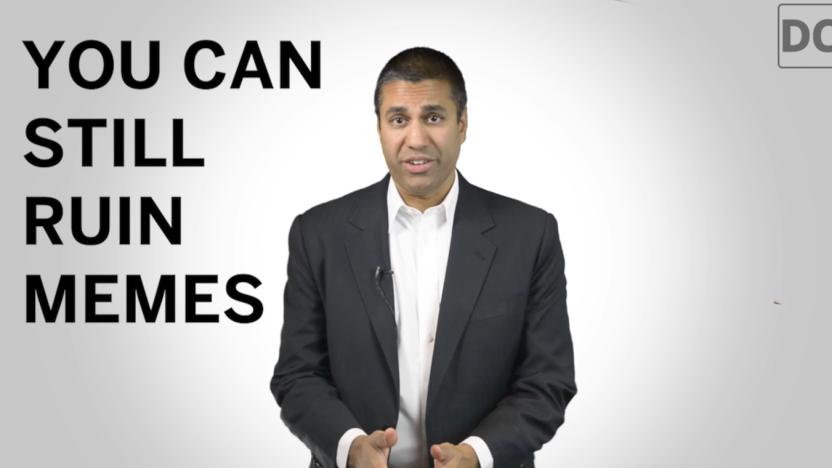fairuse
Latest

US court rules that using online photos can be considered 'fair use'
In the real world, copyright legislation seems simple enough -- don't steal something and claim it as your own work. Online, however, things are murkier. The EU Parliament recently passed a law that would stop users from uploading copyrighted content -- but in the digital age, what does 'copyright' actually cover? An Insta picture of your morning coffee? A meme? What about a cropped photograph of a D.C neighborhood? It's the last of these options that resulted in a legal tussle, and ended with a federal court ruling 'fair use'.

The FCC's 'Harlem Shake' video may violate copyright law
This is a bit ironic. When FCC chairman and former Verizon lawyer Ajit Pai uploaded a video this week detailing all the things we'll still be able to do after he killed net neutrality, he apparently forgot one key step: asking permission. You see, part of the smarmy and glib clip the FCC produced with The Daily Caller has EDM producer Baauer's "Harlem Shake" in it. Baauer claims he received no licensing requests for the once-viral track and in a tweet pledged that "I'm taking action. Whatever I can do to stop this loser."

European commission pulls free roaming plan after complaints
The European Commission has pulled down its free roaming plan for European residents, just days after it first posted it. "In light of the initial feedback received, President [Jean-Claude] Juncker has instructed the services to withdraw that text and to work on a new proposal," the EC said in a statement. Consumer groups had assumed that free roaming in Europe would come with no strings attached, so were surprised to see relatively short, strict limits. "The Commission is setting the bar too low," consumer group BEUC told Politico.

Google won't face Supreme Court fight over book scanning
After many years, Google's efforts to scan out-of-print books for online searching is officially in the clear. The US Supreme Court has declined to hear an appeal over Google's victory in a legal dispute wit the Authors Guild, effectively determining once and for all that the book scanning (which focused on excerpts) represents fair use rights. The Guild had contended that Google's move violated copyright and potentially hurt profits, and would have had the internet giant pay damages.

'2001: A Space Odyssey' as 569 GIFs tests fair use limits
If there was a grand prize for "Most Work Done to Prove a Point" (and "Fanciest Name Ever") Jean-Baptiste Henri Franck Cyrille Marie Le Divelec would be a contender. For 2001: A Gif Odyssey, the ad agency creator painstakingly chopped Stanley Kubrick's 2001: A Space Odyssey into 569 tiny GIFs to find the breaking point of the so-called fair use doctrine. Fair use, as a reminder, is a legal principal that allows people to use copyrighted material for commentary, criticism, news reporting, scholarship or research. At the same time, it also serves as an "affirmative defense" to protect artists.

Copyright exemption lets you modify old games to keep them running
You no longer have to dread the day that a game developer shuts off its servers and renders your favorite title unplayable. As part of a series of DMCA copyright exemptions, the US Library of Congress has granted long-sought permission to disable authentication server requirements in games where a server's shutdown will completely break the experience. Historians can even hack the consoles themselves, if necessary. This doesn't allow you to tweak games where you'd only lose multiplayer modes, but it does mean that at least some aspects of a classic game will live on.

US appeals court rules Google's book-scanning project is legal
Google's goal of scanning millions of out-of-print books for online access has drawn the ire of authors and publishers for years. Today, a US appeals court ruled that the practice is in fact legal. Claims of infringement brought by the Authors Guild and a group of writers were rejected by the 2nd US Circuit Court of Appeals in New York. The court says Google Books offers a public service by posting pieces of text online and that it doesn't encroach on laws that protect intellectual property. Instead, the practice falls under "fair use." This isn't the first time the legal system has sided with Mountain View, despite repeated attempts by authors, publishers and rival tech companies to combat the book-scanning project. Back in 2011, a $125 million settlement was rejected by a judge in New York who originally approved the deal in 2009 four years after the first lawsuit was filed. Perhaps today's ruling will be the last we hear of the Google Books saga. But then again, probably not. [Image credit: Justin Sullivan/Getty Images]

No thanks: JPEG images may soon have copy protection
So much for hopes that the tech industry would back away from copyright protection any time soon. The Joint Photographic Experts Group recently launched a Privacy & Security initiative that potentially brings digital rights management (DRM) to regular JPEG images, not just the specialized JPEG 2000 format. The proposal could protect your privacy by encrypting metadata (such as where you took a photo), but it could also prevent you from copying or opening some pictures. Needless to say, that opens up a can of worms when it comes to fair use rights. If someone slapped DRM on a photo, you couldn't use it for news, research or remixed art -- many of the internet memes you know wouldn't be possible.

Appeals Court: Copyright holders 'must consider fair use' before sending DMCAs
The 9th Circuit Court of Appeals has ruled against Universal Music Group in a 2007 Digital Millennium Copyright Act case that could change how and when copyright holders can send takedown notices. The case revolves around a takedown notice sent to YouTube user, Stephanie Lenz, who posted a sub-30 second video of her toddler learning to walk while Prince's "Let's Go Crazy" played in the background. She, along with pro bono counsel from the EFF, subsequently sued Universal for violating the DMCA's fair use statute.

UK offers long-awaited copyright reform that sanctions format shifting, remote education
Believe it or not, it's still illegal in the UK to rip a favorite CD, or even to show copyrighted work in distance education -- both fair use permissions that many North Americans take for granted. Some sense is at last coming around now that the Intellectual Property Office is putting forward copyright reforms that accept a digital reality. The measures explicitly approve private copying for personal use, making it legal to shift formats as long as it's to play purchased content. Many of the reforms also clear up the murkiness surrounding institutional use: analysts, researchers and teachers should have access to copyrighted material over networks, as long as it's for non-commercial purposes. The fair use terms aren't as broadly outlined as they are in the US -- these are exceptions, not general rules -- but they go a long way towards legitimizing what many wanted all along. Or, let's be honest, were already doing. [Image credit: Department for Business Innovation and Skills, Flickr]

PIPA and SOPA votes pushed back in the face of overwhelming opposition
In the face of overwhelming opposition from just about every major technology company and the general public, the US Senate and House have decided to delay votes on the anti-piracy bills known as PIPA (Senate) and SOPA (House). Majority leader Harry Reid and Judiciary Committee Chairman Lamar Smith both announced that upcoming work on the acts would be delayed, "until there is wider agreement on a solution." While both have said that concerns over piracy must be addressed, it seems unlikely that they or any other politician will be rushing to revive the would-be laws after very public protests from Google and Wikipedia and the reported deluge of phone calls and emails that hammered offices at the capital Wednesday. The fight over intellectual property rights and fair use is far from over but, as the sibling bills face yet another delay, it's beginning to appear as if SOPA and PIPA's days are numbered

Republic Wireless changes stance: unlimited will be truly unlimited, 'no thresholds' or asterisks
Credit where it's due: Republic Wireless has just made an about-face on the only major downfall we saw in its new wireless proposition. While most of the big boys have had an asterisk by "unlimited" for years on end, these guys were called out as being "deceptive" due to its convoluted "fair use policy." Instead of revising it, the upstart carrier is just throwing it out. Completely. "From today, Republic Wireless is all-in." That's according to a refreshing blog post tossed up on its site hours ago, where we're told that it's eager to accept feedback and adapt as necessary. Looking for more proof? How's about this: "Rather than revising our fair use policy, we've decided not to have one at all. There will simply be no thresholds, and no risk of losing service. We're doing away with all of that to keep all of the focus instead on where it really belongs: Creating a new wireless future together. A future that is simple to understand, unfettered to use, and an amazing value for all. That's what we started down this path to do. That's where the power of this vibrant community, dynamic WiFi ecosystem and revolutionary technology should be invested." In a world filled with GoDaddys, PayPals, SOPAs and CarrierIQs, it's downright incredible to see a 180 in this direction. And yes, as part of that legal amendment, everyone who has purchased or purchases a phone during beta will be guaranteed the opportunity to enjoy unlimited service, without fear of cancellation, until the end of beta. The only snippet you should know about is the "unacceptable use" clauses, which state that you can't resell Republic's service or leave the phone "always on" as a conduit for other uses obviously beyond what would be normal for a personal smartphone; wildly enough, the outfit has promised to "reevaluate those provisions, too." Three cheers for listening skills, eh?

T-Mobile UK backs down a bit, limits 500MB fair use policy to new and upgrading customers
Alright, folks -- if you've already got a T-Mobile UK account in your back pocket, you can breathe a sigh of relief, because that ugly new data cap doesn't apply to you. It took the operator just a day to realize that putting a hazy "fair use" restriction of just 500MB per month on existing accounts wasn't going over too well with its customer base, so they've conducted a "further review" and decided that they'll instead only be applying the rule to new and upgrading customers as of February 1 only. We wouldn't call this an outright win by any stretch -- the policy is still enormously restrictive, vague, and a pretty clear-cut disadvantage of the competition-reducing Everything Everywhere hookup, and it looks like they'll still end up tagging you as soon as you try to upgrade your plan or your hardware anyway... but we'll take whatever reprieve we can get. [Thanks to everyone who sent this in]

T-Mobile UK cuts 'fair use' allowance to 500MB, sends you home to watch online video
In one of the most insensitive announcements in recent PR history, T-Mobile UK is telling its customers who want to download or stream online video to their mobile devices to "save that stuff for [their] home broadband." The carrier, one half of the UK's biggest operator Everything Everywhere, had up until now offered one of the better monthly allowance deals with a 3GB data consumption limit on Android phones. It still is, in fact, since its new changes aren't coming into effect until February 1st, but come that fateful Tuesday, T-Mo's understanding of "fair use" will shrink down to 500MB each month -- after which point you'll still get to browse the web and email for free, but any video content will presumably be subject to an extra charge. It's not clear how "that stuff" will be handled by T-Mobile once you cross the frugal new threshold, nor is it clear whether customers who signed up for big bodacious 3GB of data will be set free once this new lockdown on mobile video is in effect. Godspeed to you all. [Thanks to everyone who sent this in] Update: T-Mobile has responded with a clarifying statement we've added after the break. There will be no surcharges for use over 500MB per month, but once you cross that line, any downloading activity will be "restricted." By which the company seems to mean "restricted to whatever WiFi connection you can scrounge up," because its 3G airwaves will be off-limits.

ReQuest threatens to enable DVD piracy on its media streamers, announces one sans DVD
Enjoy copying DVDs onto $5,000 boutique home servers? If you've got the dough, ReQuest has got you covered -- CEO Peter Cholnoky says that even if California courts make the practice illegal, his firm isn't afraid to push back. When CE Pro asked whether he was concerned about the fallout from the Kaleidescape lawsuit, he said, "Nope, should I be?" adding that ReQuest could convert existing equipment to use third-party DVD-copying software "in two seconds" should the courts try to shut him down. Given that the company's new $1,200 MediaPlayer (above) doesn't have the requisite DVD drive for ripping discs anyhow, that sounds an awful lot like braggadocio, but we have to say we love Peter's stick-it-to-the-man tone. Oh, and in case you're wondering, that MediaPlayer is slated to ship in June; you'll find a full spec sheet at our source link.

Nokia's all you can download Comes with Music service is finally DRM free... in China (updated)
We've been browbeating Nokia for using DRM to "protect" its Comes with Music offering ever since the service launched back in December of 2007 -- a time when the industry was just beginning to shed its DRM shackles. Now get this, the idle talk is over, Nokia just launched its all-you-can-eat (for 12, 18, or 24 months, typically) Comes with Music service in China without any DRM at all. India is on deck as Nokia looks to hook more emerging markets on the (kind of) free music drug. That means you no longer have to strip the DRM illegally to play your downloaded content on devices other than your main PC and Nokia Comes with Music handset. And yes, you can keep the tracks for life after your CWM subscription expires. At launch, Chinese consumers will have a choice of eight (ok, seven really) CWM handsets (X6 32GB and X6 16GB, 5230, 5330, 5800w, 6700s, E52 and E72i) with prices starting at a local equivalent of €140 (the CWM service fee is baked in to the cost, mind you) excluding taxes and subsidies. Suspiciously, Nokia's not making the usual boast about the millions of tracks available in the CWM catalog. It is, however, reassuringly supported by all the Big 4 music labels in addition to some Chinese indies, as you'd expect. Sorry, no word on when they'll strip the DRM from its European CWM stores and we're still not clear when CWM will finally see a US launch. Hopefully soon as a service like this could go over very, very well Stateside -- a market that Nokia is desperate to crack. Get on to the other side of the break for the full press release. Update: We met with Jyrki Rosenberg, Director of Music at Nokia, who shed a bit more light on the offering. Unfortunately, while DRM-free music aligns with Nokia's global vision, he had nothing to announce for the US or Europe today. And as you might expect, the onus to go DRM-free in China was in part driven by rampant, local piracy concerns -- recovery of any revenue was better than nothing at all in the eyes of the Big Four. Jyrki also told us that Chinese CWM subscriptions will be 1 year in length but the terms of renewal are still being hammered out. We also know that the music catalog numbers in the "hundreds of thousands" at launch (comparable to competing services in the region, according to Jyrki) and is growing every day. Privacy advocates will be happy to hear that the 256kbps MP3 files are "clean" -- in other words, no user data is embedded in the files unlike the practices of Apple and Walmart, among others.

Ovi Music Unlimited replacing Nokia Comes with Music branding
We can't say that we'll miss the awkwardly named Comes with Music service branding from Nokia. Of course, we're making the assumption that India's recently christened Ovi Music Unlimited store will be making its way global as Nokia continues to tighten up its service offerings in the race to compete in the era of modern smartphones. It's certainly consistent with the new Ovi Music naming convention so why not. Otherwise, it looks like nothing else about the all you can eat (for a year) music offering has changed -- particularly the DRM that locks "your" music to your PC or CWM OMU handsets for life-ish.

Nokia Ovi Music store slowly shedding its DRM shackles globally
While not widely touted, Nokia's Ovi Music store is on track to make Nokia's music catalog DRM-free globally. This was first mentioned in December at Nokia's Capital Market Days event. Keep in mind that we're talking about Nokia's a la carte music download service, not its all you can eat Comes with Music offering that lets you keep all the tracks you can download in the first year but locks them to a single Nokia handset and PC for life. Russia's Ovi Music store was the first to go DRM-free back in November while adding single sign-on with other Ovi services during the revamp process. Now we're hearing that India has quietly joined suit with its Nokia Music store becoming the DRM-free Ovi Music incarnation. Nokia is apparently focusing on growth markets first on its way to more western markets but it's a good sign that its fair use debilitating DRM is on the way out -- a good thing for consumers and a change, like free Ovi Maps, that makes Nokia handsets just a bit more attractive.

RealNetworks not giving up on RealDVD, plans to appeal court injunction
RealNetworks found itself on the wrong end of a gavel back in August, receiving a court injunction to stop selling its RealDVD software -- curiously flying in the face of an earlier ruling in the favor of Kaleidescape. Perhaps that's why Real isn't done fighting yet. Or, perhaps it's just because it doesn't want to be put out of business. Either way, the company is set to file an appeal and take the show back to court again. Exactly what the basis of their appeal will be remains to be seen -- assuming there is one -- but here's to hoping it's a little more legally sound than their last defense. We're not quite ready to give up on Fair Use just yet ourselves.

Kaleidescape gets in line behind RealDVD for rough treatment
When it rains it pours -- right on the heels of the punishing blow dealt to RealDVD, the money-laden Kaleidescape crowd suffered its own setback at the hands of the law. You just know that the DVD CCA (Copy Control Association) appealed the 2007 ruling that allowed Kaleidescape owners to rip DVDs to their media servers, and yesterday a California Appeals Court overturned that ruling. Next stop -- the Santa Clara Superior Court, which could place an injunction on Kaleidescape if the appeal is upheld. It's not over yet, but we're prepping the soundboard with ominous music, boos and noisy hand-wringing. Whatever (and whenever) the outcome, we can only hope that Blu-ray's Managed Copy comes to the scene sooner rather than later and settles this issue for our beloved HD content








